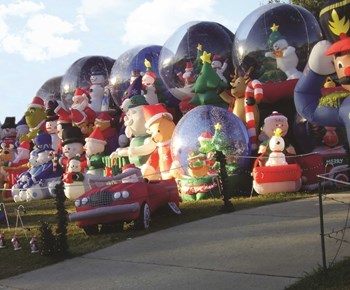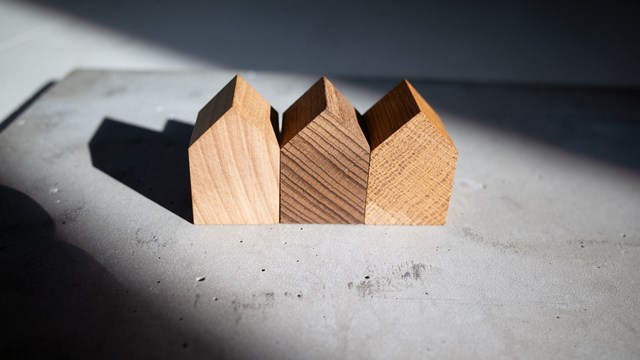
Holiday decorations are an easy way for an association to spread some seasonal cheer and add a cozy, communal vibe to the neighborhood. But what was once a practice limited to a couple of lights, ornaments and a menorah or two has migrated toward a decorating empire complete with 10-foot tall blow-up Santas, multicolored lights that pulse and twinkle and even moving reindeer and elves, synchronized to holiday music.
While not all building communities or associations choose to outfit their buildings with such elaborate décor (or want the supersized energy bill that comes along with it), navigating the community decorating scene can be tricky at times. For co-op and condo residents’ potential arguments about religious decorations can make the season a lot less festive.
This holiday, the biggest of them all, tend to create the most fuss among condo residents as childhood memories and religious intentions collide with the 'rules.' So before you hang those stockings and plug in those lights you may want to check house rules and bylaws first.
Decorating 101
Whether it’s with simple lights or elaborate displays, each community will vary in regards to the quantity of decorations it allows. There are associations that prefer modest touches and others that have full-on contests between neighbors. Regardless of the decorating preferences, guidelines can be found, in most cases, in the governing documents.
“Some buildings have decorating policies and some don’t,” says Mindy H. Stern of Schoeman Updike Kaufman Stern & Ascher LLP in New York City. “Sometimes the policies are written and sometimes they are informal. It’s very common for buildings over the years to have developed policies whether they have them in writing or not. There are policies that relate to the board-sponsored decorations in common areas of the building and decorations that are installed by shareholders or unit owners on their own doors. For example, some will just flat out prohibit unit owners and shareholders from decorating their own doors; others will have policies they want people to follow. “
In order to prevent clutter and overload, some building boards and associations may be more restrictive in terms of where seasonal fixings can be placed. “Some buildings won’t allow someone to install a whole nativity scene in front of their door, putting aside religious issues associated with that, stuff on the floor of the hallway can create a hazard for people coming and going. It’s also a safety issue.”
“Very few cooperatives and condominiums have ‘formal’ policies on anything,” says New York City-based real estate lawyer Drew S. White. “Usually they don’t like to commit themselves and they don’t want to reduce a lot of things to writing. Most policies or bylaws are related to policies like odors or smoking in sublets. I’m not aware of formal policies or written policies on holiday décor. There may be some, but none of the buildings in which I’m involved have any.”
“Buildings and boards have a tendency to like decorations that are placed out in the common areas that address both Catholics and the Jewish faith,” says John Wolf, president of Alexander Wolf & Company, a real estate management company with offices in Plainview, New York and New York City. “Some buildings have very strict regulations that nothing—no decorations can be put on the exterior of doors. Some of them are relaxed around the holiday. It varies from building to building.”
Religious Issues
Though the holidays typically evoke images of Christmas trees, in today’s multicultural associations it’s highly probable that residents celebrate Hanukkah, Kwanzaa or choose not to observe at all. There have even been legal battles regarding religious items.
In 2001, the condominium association at the 378-unit Shoreline Towers in Edgewater, a neighborhood in Chicago, attracted controversy when it adopted a rule banning “mats, boots, shoes, carts or objects of any sort outside unit entrance doors.” It was determined that the rule must be enforced in an absolute manner. As a result, mezuzot (small, ritual items affixed to doorposts of Jewish homes, which contain biblical verses written on parchment) were removed from residents’ doors. Numerous complaints ensued alleging housing discrimination on the basis of religion.
As a result of the controversy, Chicago’s Municipal Code was amended in 2005 to make it illegal to prohibit a renter or owner of an apartment, house or condominium from placing or affixing a religious sign, symbol or relic on the door, door post or entrance.
"It's the dispute between freedom of expression and religious things that can be deemed offensive and that's where the fine line lies," says White. “The best way to handle those things are with common sense and neutrality. With respect to neutrality keep the religious-related decorations to a minimum or not at all. In most lobbies, they will have a Christmas tree and a menorah but then you get others that may feel excluded. Generally speaking a very neutral holiday theme is recommended; posing the least risk.”
“Due to the fact that we live in a multi-religious society there should be some effort to include everyone,” says Stern. “It’s common to have both a tree and a menorah and any other decorations that would be in honor of Kwanzaa or any other religious celebrations. The board should be sensitive to that.”
Making Peace
If an association is constantly dealing with problems related to seasonal décor, implementing a total ban might be seen as tempting but many courts might consider it unreasonable. Most residents enjoy holiday displays and prohibiting them could lead them to question their freedom of speech and religion.
“Once again you just have to use common sense and keep religious decorations to a minimum,” says White. “If there are decorations for Halloween or any other holiday you should put a time frame in. No holiday decorations after January 10th. And it just looks tacky to have it up there in March. You want the residents to be free to express themselves but limit it, in some common-sense way. When it comes to decorating their doors, many times people will have a limitation on what can be put on a door. The front door in the hallway is the property of the co-op or condominium so the building has jurisdiction over that.”
“One way to make peace is by placing decorations that would appeal to all religions in the lobby that would demonstrate that the building is mindful of everyone,” says Wolf, and the decorations that are on the front door should be kept to a minimum.”
“The other thing that’s important to recognize is that people suffer from allergies and there may be certain decorations that may create more discomfort than others,” adds Stern. “That should be taken into account and the board should also be aware of fire code regulations that govern the use of live trees inside buildings.”
Harmonious Holidays
Decorating a community for the holidays can be tough, especially with differences in culture and expectations. And while some boards experience residents going a little overboard with lights and trimmings, in general, seasonal enhancements aren’t too painful and have some great benefits for the community as a whole such as fostering camaraderie among the residents and promoting a festive, holiday spirit within the community.
The general consensus is that tasteful, seasonal decorations have a way of spreading good cheer during the holiday season and residents of cooperative housing want to be part of a community or they’d live in a remote, cabin deep in the woods of Maine.
Christy Smith-Sloman is a staff writer for The Cooperator. Freelance writer Maggie Puniewska contributed to this article.






Leave a Comment